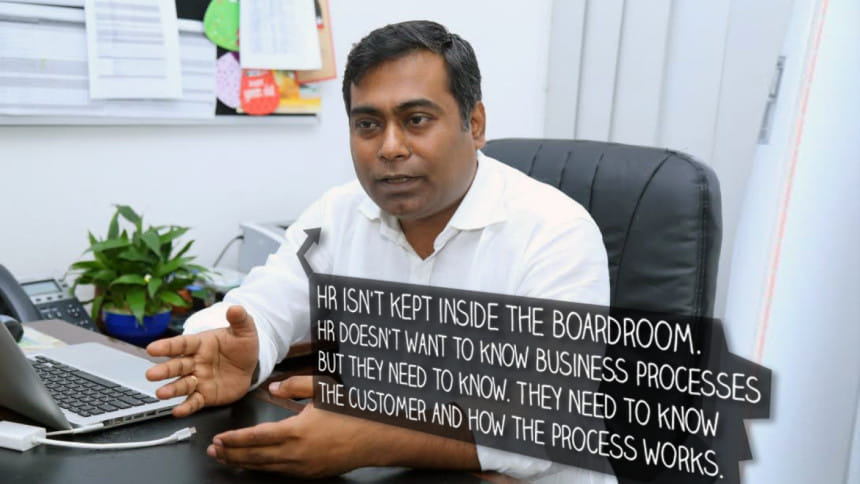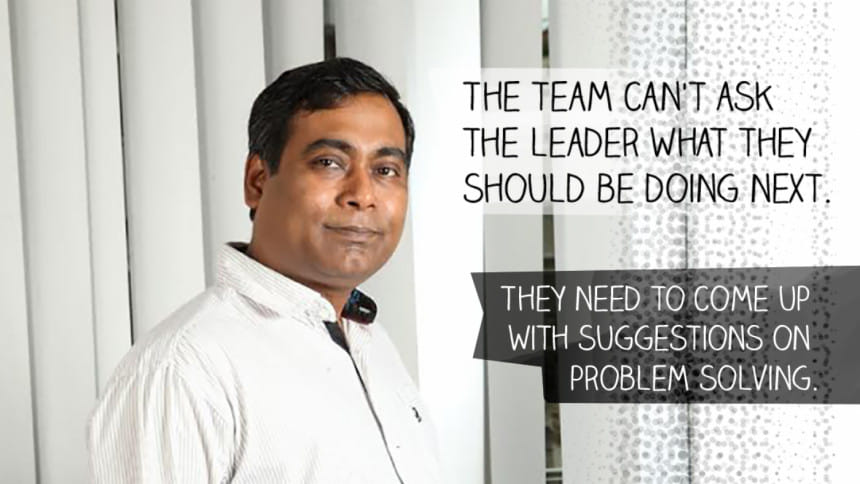Talent management: The next big business sector

Today's Face-Off candidate is Ahmed Pasha, Director of Strategic HR in Edison Group since June 2009. I met up with him to discuss the biggest asset of any company: its people. And we followed up with his tips on how to manage daily stress and avoid selfie-infested Facebook.
Human Resource Management is yesterday's term. People aren't the metal and oil machinery of an organisation. They are a dynamic tool that changes and brings about change when guided well; people are the talent. And talent management is the single biggest factor that could make or break any organisation regardless of its heritage.
Next Step (NS): Edison Group has many business wings, notable of which are real estate and Symphony. How does it stay relevant when the market is so competitive and in many cases saturated?
Ahmed Pasha (AP): It's done through continuous change and learning. The key question to ask of any company's growth is 'How fast and adaptive is the management?' These days flexibility and adaptation are the biggest growth drivers. Otherwise any organisation will fall behind, if not worse.
(NS): That's the big picture. How do you break it down into a doable model that brings about results?
(AP): We help our employees choose via empowerment. The team can't ask the leader what they should be doing next. They need to come up with suggestions on problem solving. We empower them by letting them make the decision. When they come up with options, we ask them for their preferred choice. As team leaders, our job is to evaluate and help realise the best outcome offered by our team mates.
(NS): Red tape and formalities cause a big bottleneck. How is that solved?
(AP): We've done this thing called signature regulation. Many tasks require the boss' authorisation via signature. It slows down the process. We have reduced signatures by 15 percent last year. That means more deputies can get more done quicker without having to run back and forth getting papers signed by department heads. They are authorised to make the judgement call. A further 25 percent is planned to be reduced. That way, they complete the task and present the final product to the boss.
(NS): What do you call an effective operating philosophy?
(AP): Bring the positive – it's the one theme I push for the most. I want people to bring about positive changes through responsibility and cooperation. People are responsible for the overall smooth rolling function of an organisation and that can only happen via cooperation. Many hiring processes look only at competency, a person's skill-set. Functional competency is secondary to positivity. If a football player doesn't pass to a player in a stronger position, the team will lose. And everybody is important regardless of the size of their role. Think of a typical Bangladeshi home; the day the chauffeur or maid doesn't come, we realise how important they are.

(NS): HR is still a bit of a magic trick in Bangladesh. Most people don't know how it works. Hence the occasional lack of interest. How does it fail?
(AP): Typically HR in Bangladesh is relegated to a policing role. They hire, fire and issue letters of admonition. Management on the other hand wants to do the good stuff: hand out letters of recognition and raises. This creates a huge distance between them and other departments.
(NS): So how does it win?
(AP): HR needs to be pro-business meaning they need to be interested in the whole business process. Their main job is to understand the differences across departments and assist cooperation. That way they can better serve as part of the decision making team as well. Otherwise departments work on their own and lose their heads over not doing something.
(NS): Where is HR heading now?
(AP): HR earlier in the 30s and 40s used to primarily work with labour codes and was known as the personnel department. HR is now known as talent management. After 2020, the most preferred sector will be IT, second will be HR. In the 50s it used to be manufacturing. Because people are the most dynamic resource, HR has to be brought on-board. HR isn't kept inside the boardroom. HR doesn't want to know business processes but they need to know. They need to know the customer and how the process works.
(NS): How do you de-stress?
(AP): Stress results from things you don't like. If I am invited to a 'dawat' where I am given to eat something I don't like by the guest, I'm stressed because I don't want to offend anyone. My work on the other hand doesn't create much stress because I love my work. And I am a fun-loving guy. I love to travel. I travelled almost all the districts as a student. In 2000, I walked all the way to Keokradong. When ships wouldn't go to Saint Martin, I went there thrice using fishing boats.
(NS): But technology also creates stress. Traffic jams, cars and Facebook.
(AP): Facebook can create stress too. It changes your mood and affects it in a few seconds as you glance through so many varied status updates. That rapid change is a stress creator via news of death, travel, political strife, religion and posts by Moja Losss. Different opinions create different reactions in you. Facebook is a helpful tool if you can use it right. I get most of my economic and political news updates quicker via Facebook than regular news sources.
(NS): Facebook is also more than 50 percent selfies. (This brings about a chuckle followed by agreement)
(AP): Yes, if you are concerned too much with selfies, it will waste your time. It's how we utilise technology. Dynamite was invented to create roads.
Writer is Editor of the career, tech and automobile publications of The Daily Star. He is also an entrepreneur of a baby clothing business and previously worked in advertising as a Senior Copywriter

 For all latest news, follow The Daily Star's Google News channel.
For all latest news, follow The Daily Star's Google News channel. 



Comments